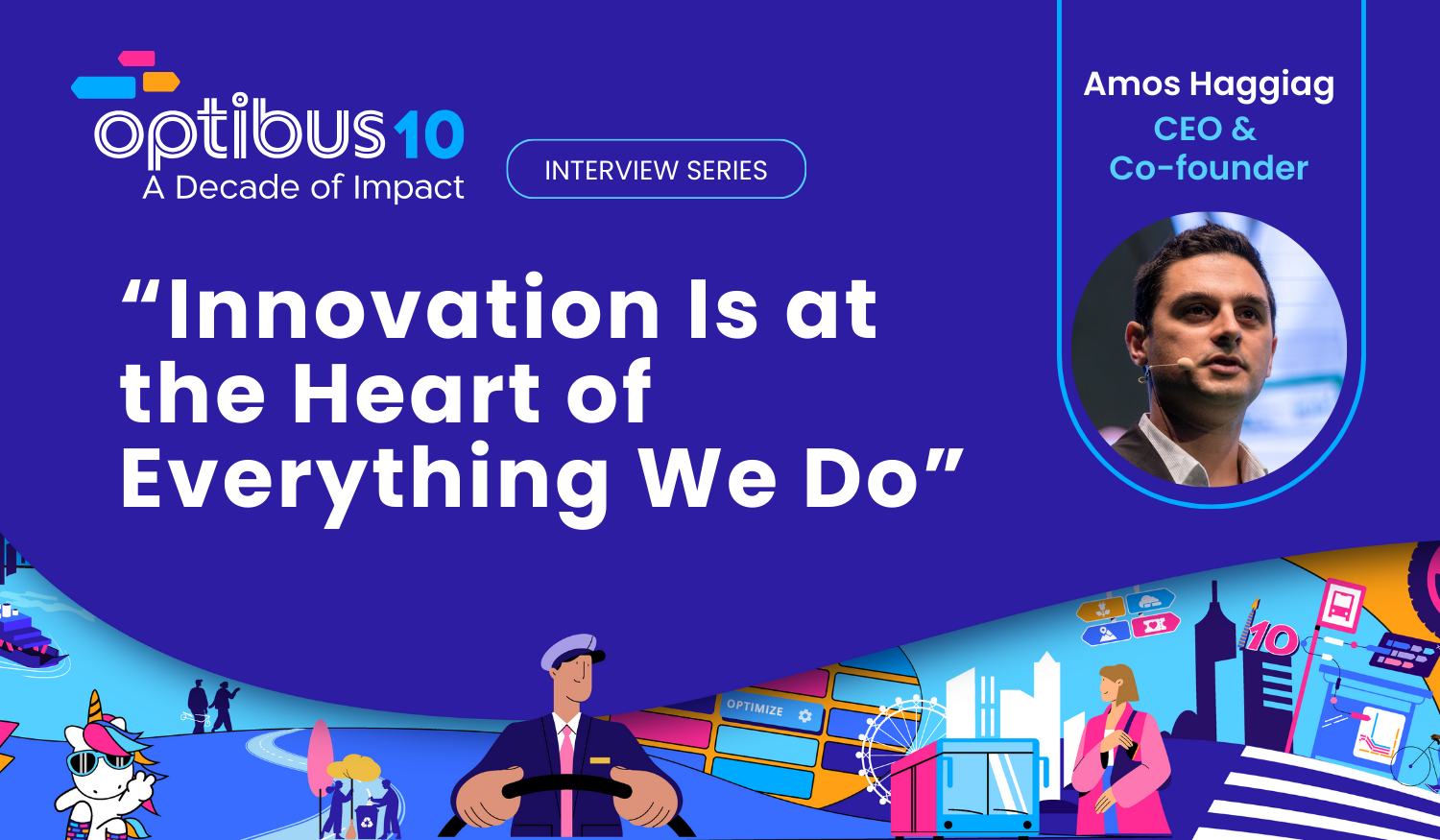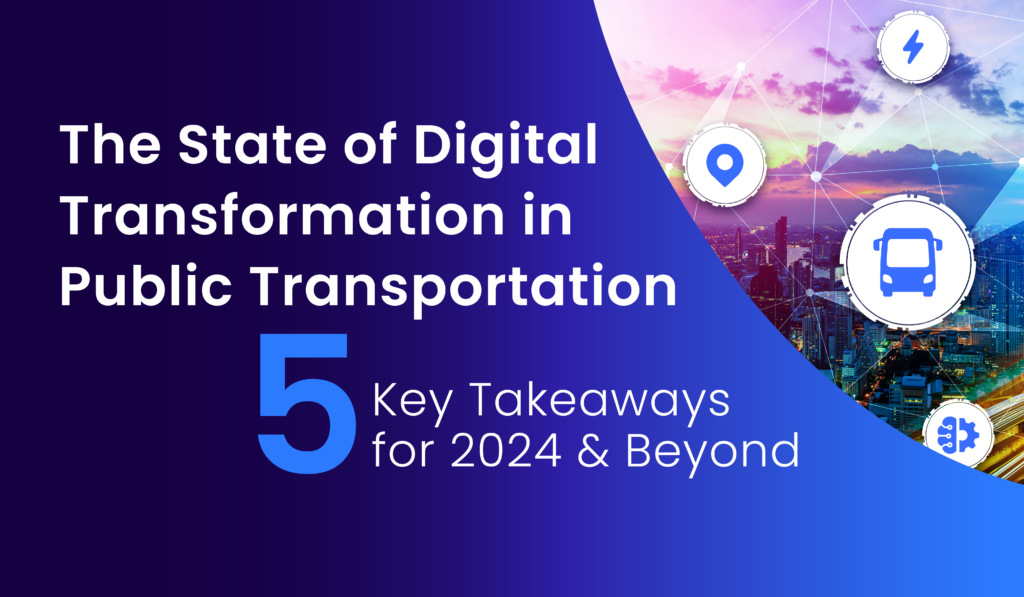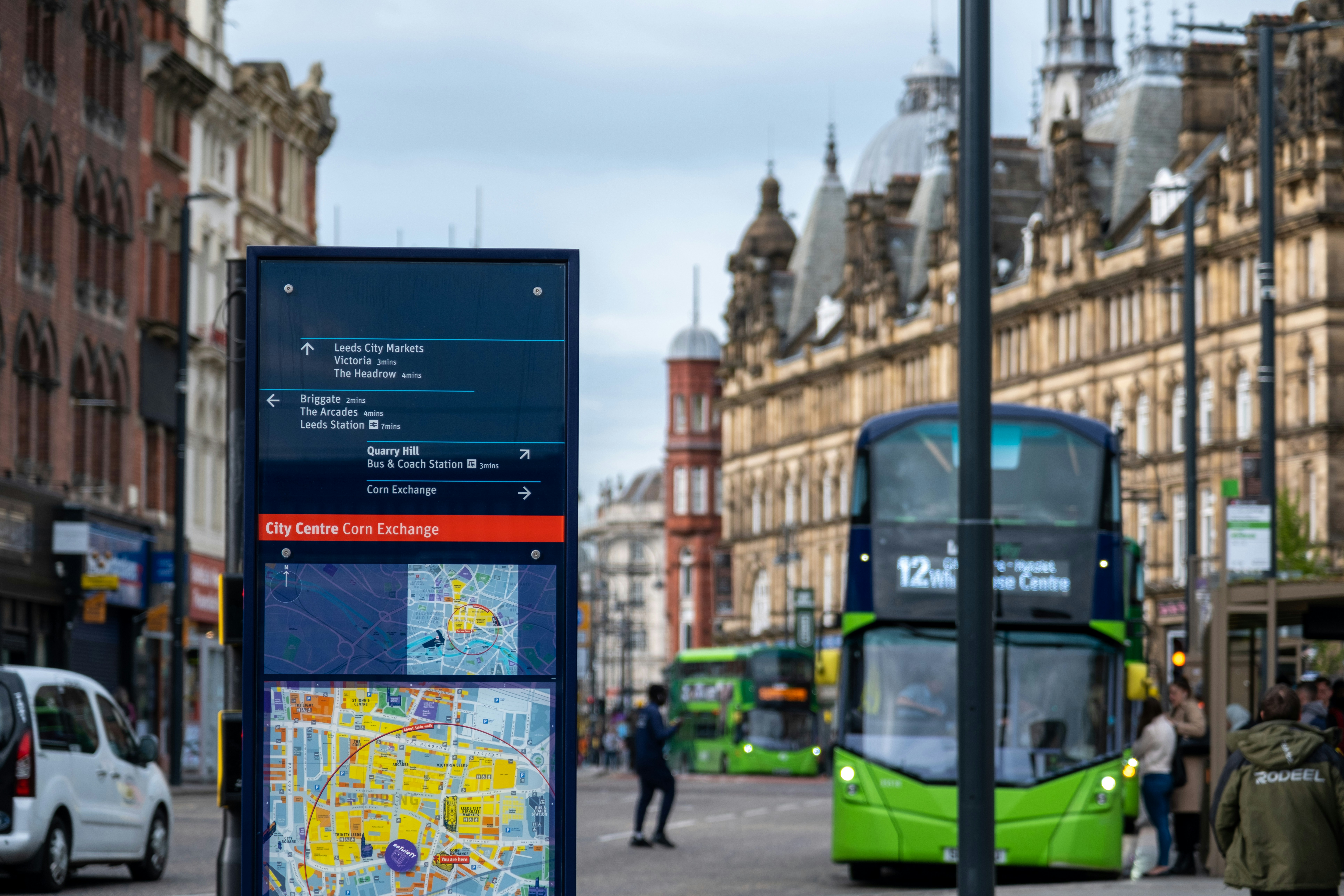%20(2).png?width=750&height=438&name=10%20Y%20interview%20series_6%20employees%20%20LI%20%20FB%20%20(1500%20x%20875%20px)%20(2).png)
Welcome to the third edition of our "A Decade of Impact Interview Series," celebrating Optibus' 10th anniversary. In this edition, we focus on the reflections and insights from some of our early regional employees, offering a unique glimpse into the evolution of our company through their eyes. Join us as we explore their stories of growth, challenges, and successes over the past decade, and celebrate the incredible impact they’ve had on making public transportation better. Together.
Lior, when you joined Optibus in 2014, you were one of the first employees after the founders. How do you think the company's vision and approach have evolved from those early days to now?
When I joined Optibus in 2014, I was inspired by their clear vision to revolutionize public transportation with cutting-edge technology. Back then, our focus was on demonstrating the potential of novel algorithms and cloud-based solutions to optimize transit operations and improve their efficiency. We faced significant challenges entering a conservative market with a minimal product offering, but our dedication to innovation saw us pioneering modern scheduling and planning tools that set new industry standards. From focusing on a few pilot clients in a local market, we expanded globally, adapting our solutions to diverse transportation ecosystems across the world.
As the company grew, so did our team and culture. We've evolved from a small, tight-knit group into a diverse organization that fosters collaboration and innovation. Today, Optibus' vision has broadened. We aim not only to optimize public transportation but also to be the end-to-end platform for public transportation operation, significantly improving the experience of passengers.
Despite the immense growth and changes, what core aspect of Optibus has remained unchanged since you joined?
I've had the privilege of witnessing our remarkable journey over the past decade. The core aspects that have remained unchanged since I joined are our values and the people. The Optibus values were very visible from the beginning: determination, caring, innovation, and impact. These values weren’t just spoken; they were displayed by Amos and Eitan daily, leading by example.
One notable challenge was a pilot we had in Canada. We needed to create a complete duty schedule, relief car schedule, and roster in less than a month without the capabilities to do any of those at that time. Through pure determination, innovation, and impact, we delivered an efficient and fully operational schedule that secured a major deal in North America.
Another core aspect is the people. We have high-quality individuals who care about transportation and Optibus, smart and determined to make this a success. This was evident when we broke into the UK market. We had to develop a lot of products, open a new office, train solution engineers, onboard users, and keep clients happy. We overcame this challenging period because the entire company came together.
Meital, starting as one of the first Solution Engineers in Israel and later moving to San Francisco to help establish U.S. operations, how did your roles evolve at Optibus, and what were the key challenges and successes you experienced during these transitions?
At Optibus, my journey began as one of the pioneering Solution Engineers in Israel, where I played a pivotal role in laying the groundwork for our operations. Transitioning to San Francisco to spearhead the establishment of our U.S. presence marked a significant evolution in my role. In the U.S., I closely collaborated with our first major customer, guiding them from a successful Proof of Concept to seamless onboarding, providing training, and ongoing support. Additionally, I partnered with our sales team to engage potential clients nationwide, initiating Proof of Concept processes and representing Optibus at conferences.
Navigating these transitions presented multifaceted challenges. I transitioned from a close-knit team in Israel to a different office environment in the U.S., adjusting to new dynamics while being physically distanced from my support network. The U.S. office marked our first venture abroad, requiring us to pioneer remote work practices and adapt to new operational norms. Despite these challenges, I found immense fulfillment in our achievements. Witnessing clients recognize the value of our operational expertise and support was deeply rewarding.
One standout achievement was establishing a robust support system that resonated with our clients. They appreciated the continuous communication and unwavering support from our team. We prioritized listening to their needs, promptly addressing concerns, and rapidly implementing requested features. Witnessing our product evolve showcased our dedication to meeting client demands and solidified their trust in our commitment to their success.
After returning to Israel and transitioning into a developer role, what motivated this significant career shift, and how have your experiences across different roles and regions shaped your approach to software development?
In addition to learning to work more independently due to remote work and time zone differences, my journey across different roles and regions has shaped my approach to software development in several key ways. Facing technical challenges and having to solve them autonomously enhanced my problem-solving skills and deepened my technical knowledge. I discovered a genuine enjoyment for tackling these challenges head-on.
Moreover, as the local solutions team expanded and support was provided from the Israeli region, I transitioned to the dynamic SA team, where I provided technical support for operations in the U.S. and other regions. This role allowed me to leverage my comprehensive understanding of the product to address complex technical issues efficiently.
Finally, transitioning to a software engineer role upon returning to Israel was a natural progression. My approach to software development is characterized by autonomy, adaptability, and a deep understanding of both the technical intricacies and operational requirements of our product.
Kevin, what were some of the biggest challenges you faced when Optibus was first establishing its presence in North America?
As the first full-time presales engineer in a new region, the primary challenge I encountered was understanding the market fit for North America. This region's dynamics differ significantly from other regions where Optibus operates, particularly in the distinction between transit agencies and operators. A tailored approach was necessary to effectively engage with our existing customer base. Key challenges included grasping the unique use cases of publicly funded agencies and developing successful RFPs, both of which were unfamiliar territories for me. Additionally, having no prior experience in the public transportation sector, I had the opportunity to acquire valuable knowledge and expertise in this industry.
Can you describe a key moment or decision that has set the stage for Optibus’ future growth in the North American market?
We were at a pivotal moment that significantly impacted the platform’s growth in the North American market. From the journey of being one of the first in the region to growing with a great team, we had together closed a significant partnership with our first large agency in our region. A successful collaboration with them opened up many doors for us to go upmarket in North America.
Harry, what were the more memorable moments from the early London office?
In the early stages in the London office, there were plenty of late nights working. I remember a few of us staying till around midnight on occasions, but we all had dinner, had music playing, and chatted while getting things done. There was the occasional break to the local pub before getting straight back to work. Although it was very busy, it didn’t feel like work. We had such great morale, attitude, and team spirit that it felt like we were spending time with friends. We knew we were working to establish ourselves in Europe, and everyone bought into that vision.
Another key memory was my first Christmas at Optibus. Our office manager, Charlotte, did an amazing job organizing different events within the office and social outings. Those events helped forge friendships that will likely last a long time.
How has your role evolved, and what have you learned about managing teams across different cultures and regions?
I started as a Solution Engineer, then moved into more leadership roles within the CS department as a Team Lead and now Head of Region. My progress has been supported by continued guidance from many people across the organization, leading me to where I am now.
One thing I have learned is to always put yourself in your team's shoes and be an advocate for them, similar to how the CS department advocates for the customer. Ensuring their voices are heard across departments and pushing for initiatives that impact their daily lives is crucial.
Initially, we were a team all in one office, but now we are spread across different countries and even continents. Encouraging people to connect and learn from others is key. With the world of work moving to a more remote model, sharing knowledge and creating relationships fosters a sense of community and belonging.

Ana Letícia, what unique characteristics or challenges does the Latin American market present, and how have these influenced your approach to marketing and growth in the region?
The Latin American market presents a diverse range of characteristics and challenges, varying significantly from country to country. Understanding these nuances is crucial for accurately localizing our brand and products according to each country's specific needs. To address these challenges, one of the tactics we've adopted is focusing on creating relevant content tailored to the region and establishing strong relationships with specialized media outlets. Additionally, our partnerships with other companies in the sector, cities, and especially our clients, have been instrumental in enhancing our market presence. Notable examples include collaborative initiatives with local governments in Porto Alegre and Manaus (both cities in Brazil), case studies produced with clients in Chile, and strategic partnerships in the region and globally. This multifaceted approach has significantly strengthened our reputation and market position.
Reflecting on your journey at Optibus, how has the company's growth in Latin America influenced the global marketing strategy, and what role do you see Latin America playing in Optibus' future?
The company's growth in Latin America has had a profound impact on our global marketing strategy, highlighting the necessity of regional adaptability across various aspects such as product launches, branded content, events, and partnerships. This experience has underscored the importance of tailoring our approach to meet the unique needs of each market. Looking ahead, Latin America will remain central to Optibus' global strategy. The region's dynamic and evolving markets provide valuable insights and opportunities for innovation in urban mobility. By maintaining a strong presence and cultivating deeper relationships with local stakeholders, we aim to drive further growth and set new industry benchmarks. As we expand our solutions globally, Latin America will continue to be a key focus, helping to shape our future strategies and enhance our worldwide impact.
Adam, as one of the first engineers at the Berlin R&D site, what unique challenges did you face in integrating this new hub with Optibus’ broader R&D strategy?
When the Berlin R&D site was established, we were one of the first R&D hubs outside of the original Optibus site. This was an exciting challenge but also meant overcoming a few hurdles. To avoid silos, R&D teams were composed of developers from both sites, creating international teams and combining perspectives from different cultural and technical backgrounds. We had to find the right combination of synchronous and asynchronous collaboration that suits team members with different working days.
The challenges came with many benefits. The expanded capacity meant we could pursue strategic objectives with renewed vigor, like the launch of our Ops and Driver App products. The extended geographic distribution of our teams allowed them to be even more in touch with customers and their needs. For example, when my team, which builds the Optibus Driver App, started researching customer needs, it was great that all the different functions in our team could visit customer depots on-site and gain a deeper understanding of the bus drivers our product serves.
Overall, the fusion of the two R&D sites was very successful and paved the way for further international expansion of the R&D group into various other sites around the world.
Innovative Contributions: How do you see the Berlin R&D site influencing the future technological advancements of Optibus?
The Berlin R&D site has already had a significant influence on technology at Optibus. One example is the Driver App product, initially developed by a collaboration between designers, product managers, and software developers based in Berlin and Barcelona. This was Optibus’ first-ever mobile-first product and the first product whose main users were bus drivers. The fresh perspectives from the Berlin team helped us build a service for drivers that stands out in the industry.
Berlin, being a dynamic and international city, draws many talented people from across Europe and beyond. This makes it a fantastic place to hire technical experts not just from Germany but from all over the world.
As we celebrate a decade of impactful innovations and growth at Optibus, we invite you to join us in shaping the future of public transportation. If you are passionate about making a difference and want to be part of our dynamic and diverse team, explore exciting career opportunities with us on our Careers Page. Together, let's continue to revolutionize public transportation and create a better, more connected world.


%20(1).png)




